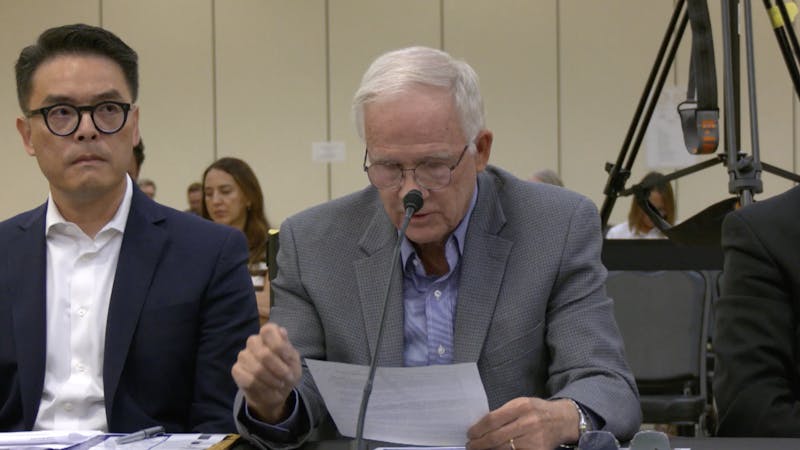Baker Institute hosts panel discussing lessons and applications of World War I
The James A. Baker III Institute for Public Policy hosted a panel discussion titled “Causes and Consequences of World War I: Can the Past Speak to the Present?” on Thursday, Sept. 29, featuring University of Houston Honors College Professor Robert Zaretsky, Associate Professor and Director of Graduate Studies Adam R. Seipp, Samuel McCann Professor of History Peter C. Caldwell and commentary by Bonner Means Baker Fellow Joe Barnes.
Robert Zaretsky
According to Zaretsky, the past itself does not speak. Rather, the interpreters — the historians — try to make it speak, and when they ask if the past speaks to the present, they need to specify which past, and which present.
“The events of June, July and August of 1914 were not the beginning of the war,” Zaretsky said. “Instead they were the beginning of the end to a story that had begun years before. But when it exactly did it begin? Did it begin in 1903, with the assassination of King Alexander and Queen Draga of Serbia? Or did it begin in the 1890s, Alfred von Schlieffen’s plans for a war fought on two fronts by Germany, or did it begin with the so called German War Council of 1912? Does this mean we should forget 1892 and the Franco-Russian Entente?”
Zaretsky said where a historian decides to enter a story is just as crucial as where she chooses to start her story.
“It goes without saying that these decisions are made by the historian’s particular present, namely the way her own time and her own place have shaped the questions she poses to the past,” Zaretsky said.
People need to be careful about equating history with learning lessons, Zaretsky said.
“All of us, I suspect, know that famous [quote] of George Santayana’s — those who cannot remember the past are doomed to repeat it,” Zaretsky said. “But we forget that Santayana was a philosopher and a poet. He was not a practicing historian. In fact, is it not equally likely that those who do remember the past are doomed either to repeat it, or to make equally appalling mistakes? Consider the actions of the European leaders during the summer of 1914. They were persuaded that the July crisis of that year, sparked by the assassination of Archduke Franz Ferdinand, was no different than the earlier crises that had traversed the continent, and that all of these crises had been surmounted by European diplomacy. They had been resolved peacefully or contained locally.”
Zaretsky said it was this past, marked by diplomatic scrambling and muddling through, that political leaders in Europe remembered in 1914.
“20,000,000 casualties, immeasurable horrors and hardship later, the world learned its lesson,” Zaretsky said. “We learn from past mistakes only to make new ones.”
Carl Caldwell
Caldwell said history seldom offers lessons, and it is important to analyze it at a specific level, not a general one.
“[History] offers complex circumstances and unforeseen outcomes,” Caldwell said. “Historical actors are only ever partly aware of what’s going on around them; often, maybe usually, they’re surprised by outcomes. If we abstract from the specifics of an event to find a general lesson, to try to utter a scientific verdict about the causes of war, we risk losing the real dilemmas that historical actors actually faced. In other words, the search for the lesson can actually obscure the history.”
Caldwell said the two World Wars seem to offer two big, general lessons about the origin of war.
“1914 seems to offer a lesson about what happens when diplomacy fails and military planning takes over — one must keep diplomacy open to preserve the peace, right?” Caldwell said. “When military plans are activated, all the good intentions of diplomats become useless with horrendous outcomes. 1938, however, seems to offer the opposite lesson — diplomatic efforts to preserve the peace at all costs can lead to disastrous consequences.”
According to Caldwell, underneath these lessons is also an interpretation of the event itself, as well as the interpretation of the event now that is compared to the past.
“To declare, as some of our politicians have, that the situation in Syria today is like 1938, is to make an assumption that something in Syria is like Nazi Germany,” Caldwell said. “I’m not sure what — whether it’s [Bashar al-] Assad’s regime, or whether it’s ISIS. The complexity makes it really hard to make a judgement on the case at hand.”
Adam Seipp
Seipp explored the question of what lessons those who participated in the first World War, and later participated in the second World War — namely French military commander Maurice Gamelin, German Chancellor and war leader Adolf Hitler, and lawyer-turned-politician-turned-President of Czechoslovakia Edvard Benes — derived.
“In these three very brief examples, what we see is a bright, flashing cautionary tale about the so-called lessons of history,” Seipp said. “These were men who watched the same war from different vantage points and who derived completely different lessons from it.”
Those lessons were mutually contradictory, Seipp said.
“In some cases, those lessons would lead directly to state policies that, in part because of what happened in the second World War, seem to us to be morally dubious or atrocious,” Seipp said. “It was the lessons of World War I, as absorbed by this cohort, that would help to fundamentally shape the far bloodier war of the 1940s.”
Seipp said, if we want to understand Europe’s disaster fully, we need to see that the two World Wars were fundamentally intertwined.
“We have to look to a generation that was not just butchered, that was not just slaughtered, that was not just a lost generation,” Seipp said. “It was a generation that absorbed the lessons it had been taught in Flanders, on the Isonzo River, in the forteresses in Galicia. A generation that absorbed those lessons all too well, even when those lessons were fundamentally opposed to the lessons learned by someone living across an international border.”
Joe Barnes
Barnes said the question of when World War I begins and ends can be applied to the current situation in Ukraine.
“You could quite plausibly say the crisis in the Ukraine is a mopping up operation at the end of a century-long struggle for mastery in Europe, the first armed portion of which ended in essentially an armistice and a stalemate, the second portion of which ended in defeat of Germany, the third portion of which ended in the defeat of the Soviet Union,” Barnes said.
Barnes said he found all of the presentations interesting.
“They gave us a small taste of how complex and contentious this issue remains after a full century,” Barnes said.
McMurtry College sophomore Ruby Sanchez said she particularly liked Caldwell and Seipp’s speech for how they animatedly wove a narrative about the figures, governments and conflicts that started the war and how they lingered into the next one.
“As a whole I thought [the discussion] was very interesting and well worth going to,” Sanchez said.
More from The Rice Thresher

Rice announces Chao College as 12th residential college
Rice announced that the 12th residential college will be named Ting Tsung and Wei Fong Chao College Aug. 19. The college, set to open in fall 2026, will contain nearly 300 on-campus beds.
Dining access fund announced following on-campus unlimited meal swipes
Rice announced new food assistance programs on Tuesday to account for the controversial change in the on-campus meal swipe plan.

Rice disaster prediction model discussed at hearing on deadly Central Texas floods
The House and Senate Select Committees on Disaster Preparedness and Flooding held a hearing on July 31 in Kerrville to address the deadly July 4 flooding in Central Texas. The flooding along the banks of the Guadalupe River killed 108 people, including 37 children. In the charged hearing, Texas lawmakers and flood survivors criticized the local response to the disaster.


Please note All comments are eligible for publication by The Rice Thresher.